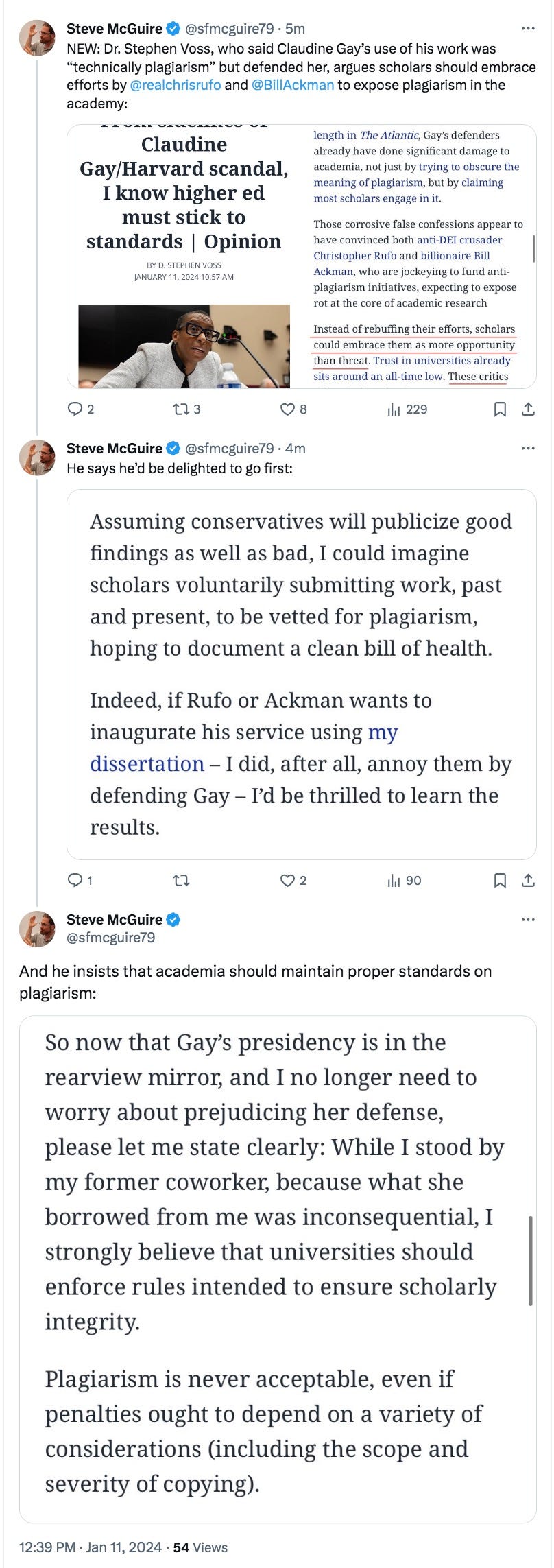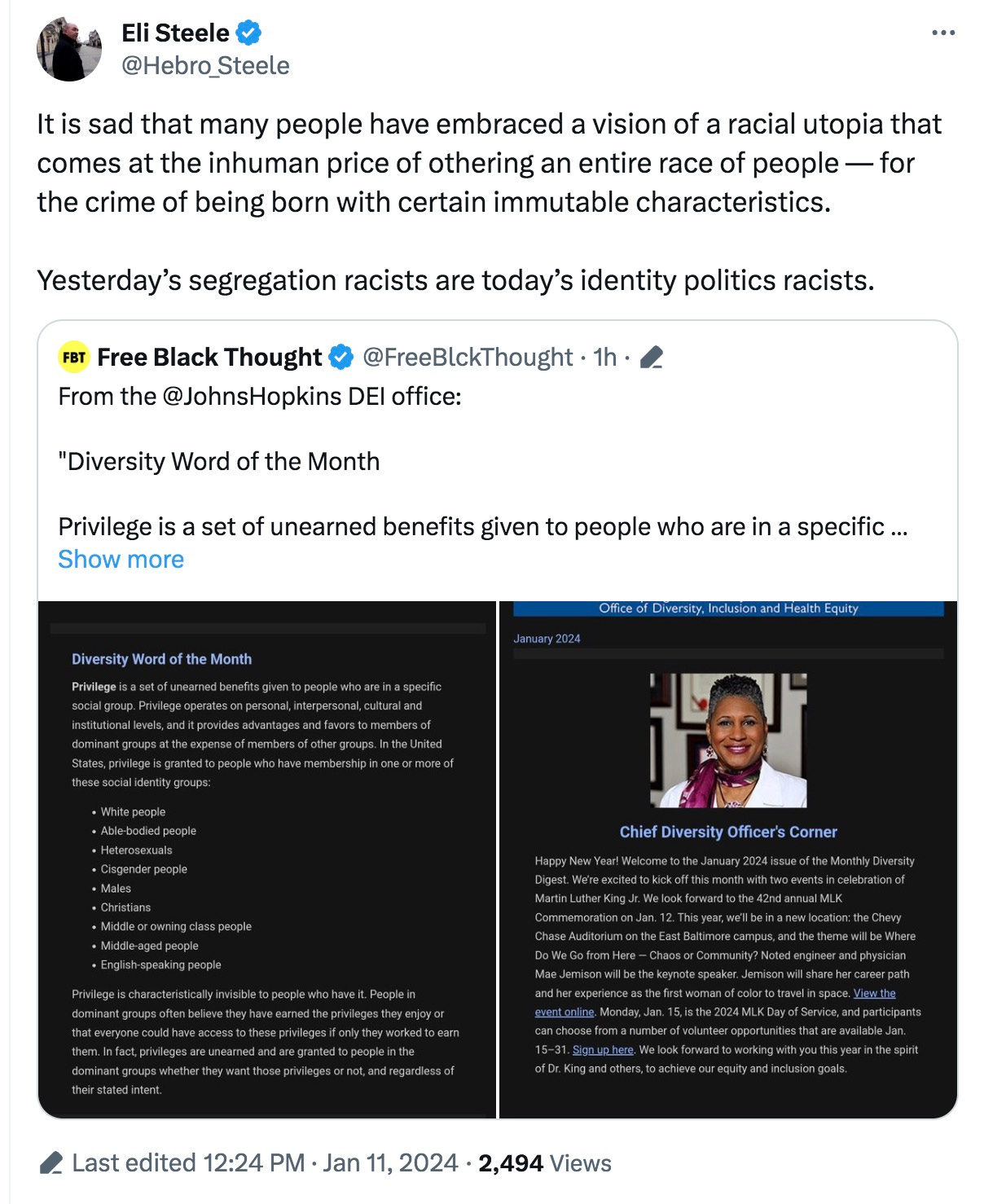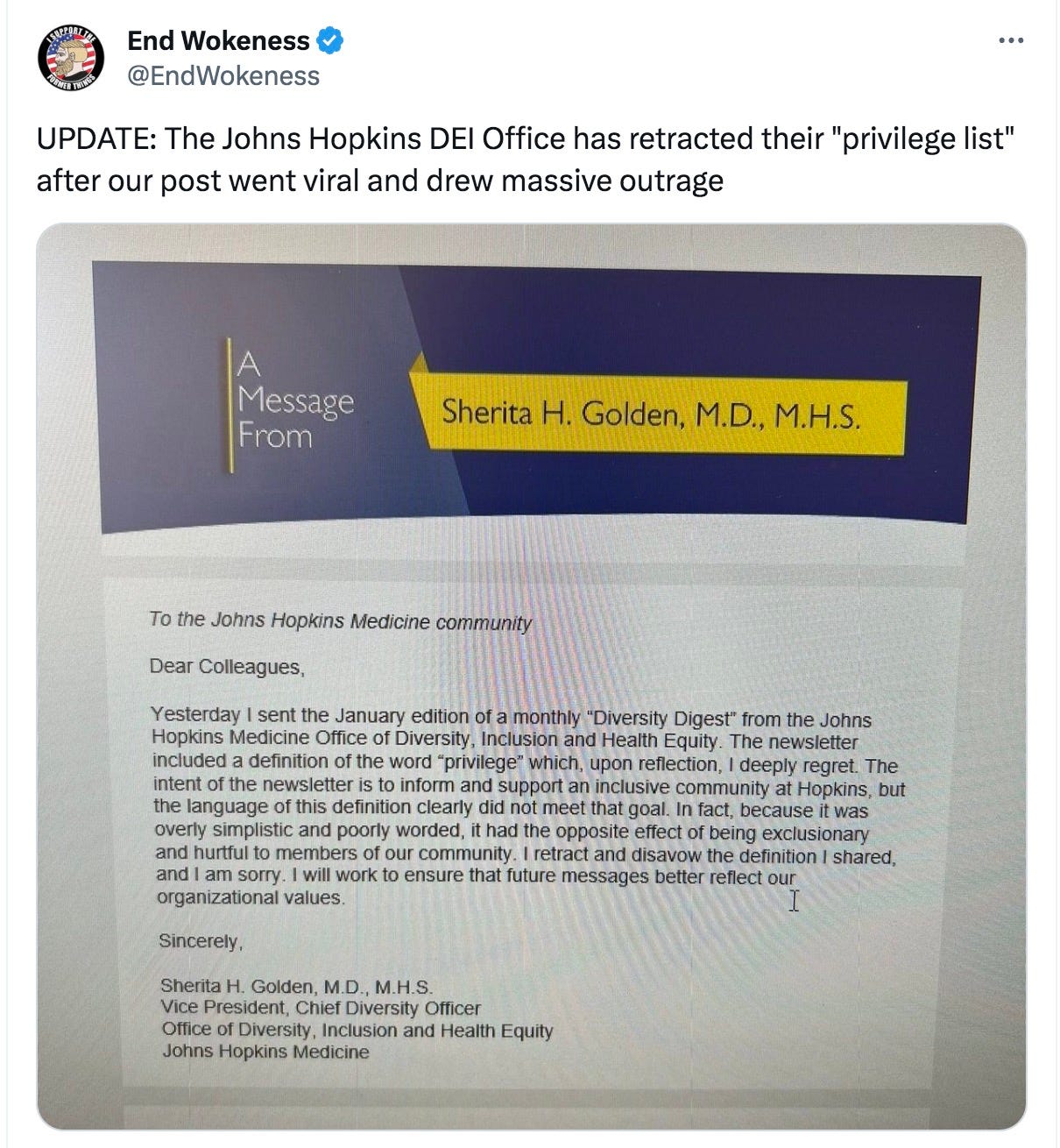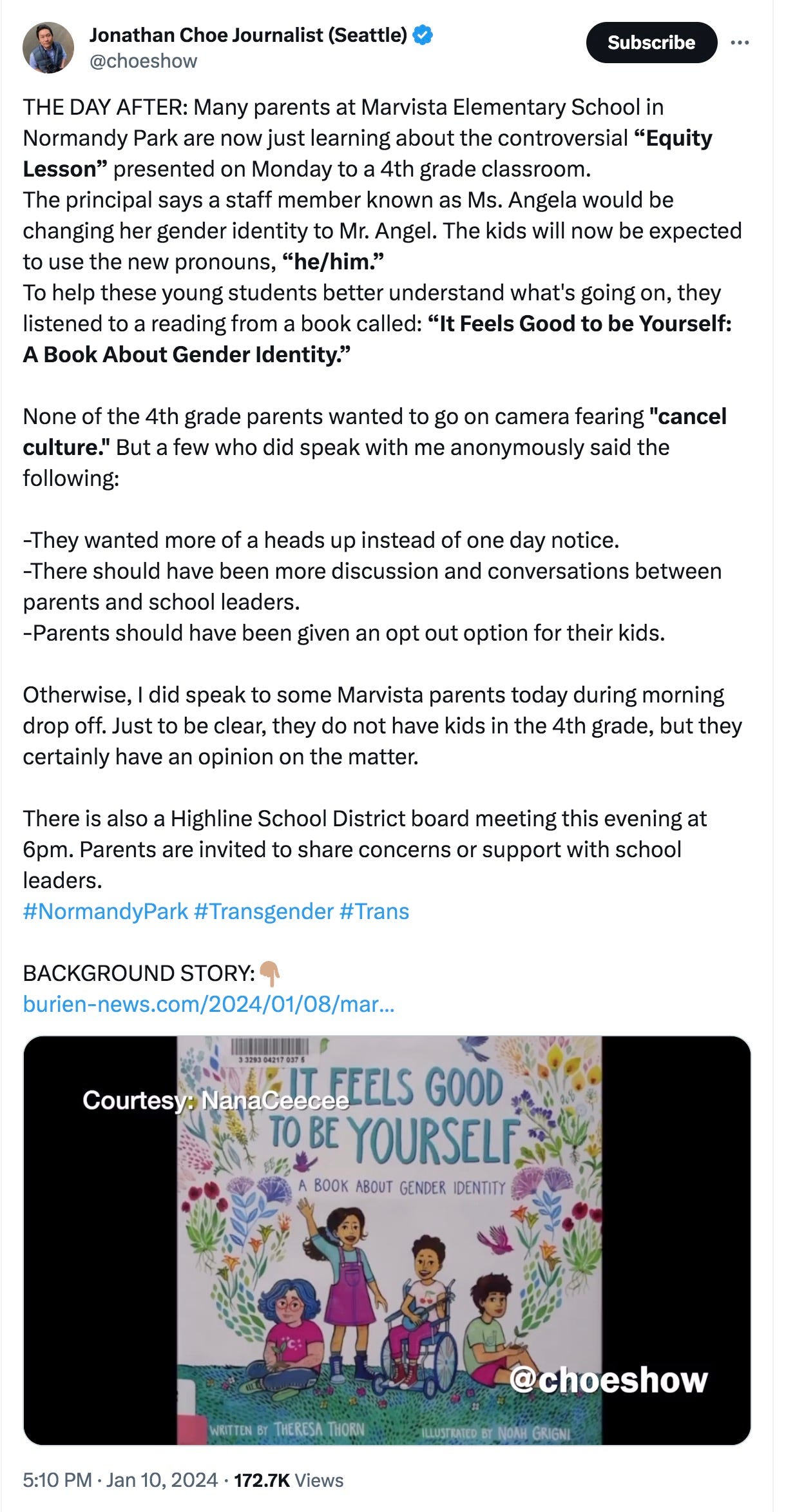E-Pluribus | January 11, 2024
The truth, the whole truth, and nothing but my truth; don't go full Godwin; two roads diverged in conservatism—taking another look at the one less traveled.
A round-up of the latest and best musings on the rise of illiberalism in the public discourse:
William A. Galston: Claudine Gay’s ‘My Truth’ and the Truth
A couple of millennia ago, Pontius Pilate famously asked Jesus, “What is truth?” Though Pilate walked out of the room without waiting for an answer, too many intellectuals today might jump in with, “Whatever you want it to be.” In the wake of the Claudine Gay debacle, William Galston writes at the Wall Street Journal about the “my truth” phenomenon and how dangerous it is to true progress in education.
In the apology Ms. [Claudine] Gay offered after her disastrous congressional testimony, she said that she had failed to convey “my truth.” As several commentators have observed, this phrase is the tip of an epistemological iceberg. It stands for the proposition that the truth doesn’t exist and that the quest for it is futile. Instead, there are multiple “perspectives,” each rooted in the position, experiences and sentiments of individuals or of groups in similar positions. If so, Harvard’s motto, “Veritas,” expresses an antique metaphysics that should no longer guide the academy’s aspirations.
No one in the sciences or engineering can take this argument seriously. If “my truth” is that water isn’t composed of hydrogen and oxygen or that a roof doesn’t require structural support, I would be laughed out of the laboratory and classroom. I certainly wouldn’t be allowed to teach students.
The situation is different in the humanities and social sciences, although not fundamentally. John Stuart Mill famously said, “He who knows only his own side of the case knows little of that.” In testing the strength of an argument, the presence—and clash—of multiple views is essential. This kind of diversity is central to the purpose of the university, which is why the dominance of a single point of view in the faculty and student body is so damaging to the academic mission. If people with unpopular views are cowed into silence, everyone loses and the search for truth is impeded.
Diversity of background and experience has its place in the university because it increases the pool of factual knowledge available to all members of the community and generates new questions that previous generations had overlooked. It had never occurred to me to ask whether homes owned by African-Americans were assessed at a lower value for reasons other than the quality of the houses and amenities of their surrounding neighborhoods. But using state-of-the-art research methods, two of my Brookings Institution colleagues—one an African-American with a wealth of knowledge about housing—were able to show that this is indeed the case. Diversity means inquiry that can widen the sphere of knowledge.
[. . .]
The quest for truth in these matters isn’t an impossible mission. There is no need to replace “the truth” with “my truth,” and there are many reasons not to. The renewal of American higher education will begin when its leaders endorse this simple proposition.
Jonah Goldberg: Never Go ‘Full Hitler’
Nothing brings a conversation to halt quite as effectively as calling one’s opponent a Nazi, particularly when it’s obvious one’s opponent is not actually a Nazi, who, thank goodness, are few and far between these days. At the Dispatch, Jonah Goldberg warns against numbing people’s minds by invoking this hoary trope (which is one reason Godwin’s Law became a thing to begin with.)
An unpopular Democratic president declares his Republican rival to be a threat to American democracy. Like Hitler in Germany or Mussolini in Italy, his Republican opponent is a “front man” for fascism and the “crackpot forces of the extreme right wing.”
[. . .]
The Republicans were emulating the “the tragic story of what happened in Germany,” the president insisted. “We know how Hitler used antisemitic propaganda as a way of stupefying the German people with false ideas while he reached out for power.” The coming election “is not just a battle between two parties. It is a fight for the very soul of the American government.”
This was Harry Truman, at a packed Chicago stadium, making his closing argument in the 1948 presidential election.
[. . .]
What’s the point of this largely forgotten snippet of political history? Well, for starters, it’s simply to point out that Joe Biden’s decision to go “full Hitler” against Donald Trump is not as unprecedented as many—on both the right and left—seem to think.
Argumentum ad Hitlerum was used against Barry Goldwater, too. On the eve of the 1964 convention, CBS Evening News correspondent Daniel Schorr reported from Germany that Goldwater’s rumored German vacation was a Nazi plot of some kind. “It looks as though Sen. Goldwater, if nominated, will be starting his campaign here in Bavaria, center of Germany’s right wing,” Schorr told Walter Cronkite, adding that the location was “Hitler’s onetime stomping ground.” Schorr went on to claim that an interview with Der Spiegel should be seen as an attempt by Goldwater to “appeal to right-wing elements.”
[. . .]
Readers of Liberal Fascism know that I could go on with Reagan, the Bushes, Gingrich, etc. Heck, FDR in his 1944 State of the Union Address, proclaimed, “Indeed, if such reaction should develop—if history were to repeat itself and we were to return to the so-called ‘normalcy’ of the 1920’s—then it is certain that even though we shall have conquered our enemies on the battlefields abroad, we shall have yielded to the spirit of Fascism here at home.”
Now, if Donald Trump were anything like a conventional conservative Republican, I’d probably be leading the barricades to write “there they go again” columns. But I can’t do that with regard to Trump.
I’m not arguing that Trump is “literally Hitler” or even figuratively Hitler. But, for the umpteenth time, one can fall well short of being Hitler and still be pretty bad. There’s a weird tendency in public debates to take terms for the worst thing—Hitler, genocide, totalitarianism, Communism, murder—and drain them of their (im)moral status. I’ve had conversations with nice liberals who know I cannot stand Trump yet nonetheless recoil when I say he’s “not Hitler” as if I am defending him.
This is not a left-wing thing, it’s a human thing. There are plenty of right-wingers who would have the same reaction if I were to say, “Bernie Sanders is not a Stalinist.”
[. . .]
I just want to make one of the simplest, most basic, points in politics and life.
Don’t cry wolf.
Read the whole thing.
Jeffery Tyler Syck : Conservatism’s Path Not Taken
Even those who consider themselves conservatives struggle at times to define what conservatism is. At Persuasion, Jeffery Tyler Syck introduces readers to Humanist Conservatism as an alternative to the conservatism of the last few decades and the recent resurgence of National Conservatism.
For the last several years, conservatism has been locked in a duel to the death between two competing ideologies.
On one side are the Fusionists—heirs of Ronald Reagan and William F. Buckley. Fusionism emerged in the mid-twentieth century as a response to the moderate conservatism of the previous generation on both sides of the Atlantic. The domestic policies of men such as Dwight D. Eisenhower and Winston Churchill alienated a great many right-leaning scholars and politicians who felt that genuine freedom required a robust, take-no-prisoners attack on the power of the state. A collection of these individuals coalesced around Buckley and his magazine National Review. They argued that conservatives needed to fuse the best of libertarian and traditionalist ideas to form a single cohesive political philosophy.
[. . .]
On the other side of the conservative civil war are the National Conservatives. They emerged from a political tradition far older than Fusionism. National Conservatism’s political goal is to sustain the moral tradition of the nation by using the full force of the state. Anywhere the nation state has been affirmed as the most important political unit, and traditional Christian morality has been widespread, National Conservatism has existed in some form or another.
[. . .]
[A]fter nearly a decade of struggle, the National Conservatives are edging out their establishment opponents. The newly elected Speaker of the House of Representatives, Mike Johnson, is a hardline Christian Nationalist, while one of the largest think tanks in America, the Heritage Foundation, happily parrots nationalist talking points at every opportunity. But the biggest indication of National Conservatism’s impending victory is the political dominance of Donald Trump. Despite facing a multitude of criminal indictments, the former president is the clear frontrunner for his party’s nomination. You just have to remember the horrors of January 6th to see that the victory of Trumpian National Conservatism in the right’s civil war would spell disaster for America.
If National Conservatism is dangerous and Fusionism is incapable of defeating it, then a third school of conservatism is needed—one that can unify the nation, preserve America’s liberal heritage, and resolve our many contemporary crises. That school of thought is Humanist Conservatism.
The concept of Humanist Conservatism was first articulated by the American poet and historian Peter Viereck in 1940. It describes conservatives who are driven by a desire to preserve the dignity of everyday human existence—those mundane practices of life that sit outside the grandiosity of constitutional systems and national traditions. Though it has been known by different names over the years, it is the ideology’s broad commitment to the most truly human aspects of life that give Humanist Conservatism its name.
[. . .]
Humanist Conservatism draws on the insights of two other prominent ideological traditions to make its case. The first is British Toryism, the complex sensibilities of which were best captured by the writer Michael Oakeshott. A distinguished professor of political theory in the 20th century, Oakeshott highlighted the great danger that absolutist thinking poses to human flourishing. On one side stand the “Rationalists” (always with a capital R in Oakeshott’s writings) who seek to march at breakneck speed to some glorious future. On the other side are the traditionalists who seek to preserve or return to some blissful past state. In between these extreme poles, Oakeshott posited a Humanist Conservative disposition. He believed that to be conservative means simply to prefer “present laughter to utopian bliss.” In other words, Oakeshott saw as conservative anyone who appreciates the best aspects of human life in the present day and does not seek to tamper with them.
Read it all here.
Around Twitter (X)
Via Steve McGuire, one of Claudine Gay’s defenders, Stephen Voss, seems to be trying to limit the damage from the whole sordid affair:
Although since retracted, Johns Hopkins Medicine went all-in on “privilege” this week:
And finally, is the 4th grade a good time for lessons about “gender identity"?” One school in Washington State thinks so and went ahead with it without even notifying parents. (Click for video.)












The terrifying part of the university DEI newsletter is that the exact opposite is true. No one is more privileged in modern society than black women. The proof is in Claudine Gay. Truly a person absolutely not deserving of her situation. BIPOCs are put to the front of the line, given exclusive benefits from Affirmative Action, plum positions in worthless departments like “DEI”, massive amounts of grants and charity, govt assistance and support since the 1980’s. On top of that white men have been held back, pushed down, and excluded from the society they built. It’s not “proper” to say but the truth requires tough conversations. If that newsletter was written truthfully- white male, hetero, able bodied would be replaced with Black, female, handicapped Muslim lesbian aka Jean Pierre the communications secretary.